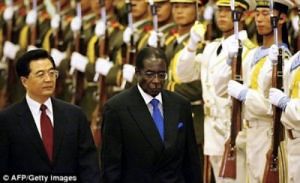
President Robert Mugabe of Zimbabwe and President Hu Jintao of the People's Republic of China during a trip to that socialist nation. Zimbabwe has developed closer ties with the PRC over the decades., a photo by Pan-African News Wire File Photos on Flickr.
WTO, Durban: China gives Africa hope
Friday, 23 December 2011 00:00
Bob Wekesa
Zimbabwe Herald
Three developments of global dimensions for Africa and China took place recently: celebrations to mark the tenth anniversary of China's accession to the World Trade Organisation, the release of China's White Paper on Foreign Trade and the Climate Change Conference (COP17) in Durban, South Africa.
Just as China's entry into the WTO has been recognised as a major contributing factor to global economic growth on all fronts, Africa too has been an overall beneficiary. Before the WTO debut, China was for most Africans a faraway oriental nation with mystical characteristics.
Few Chinese products were to be found on the shelves of supermarkets and malls in Nairobi, Lagos, Dakar or Lusaka. Few Chinese companies had a presence in Africa and were largely confined to small projects.
China's December 2001 accession to the WTO was a significant game changer as much cheaper products were availed to African consumers who had long been limited in choice to relatively more expensive Western products. Chinese companies, particularly in the all-important infrastructure development sectors started crossing the Indian Ocean into mainland Africa.
Initially, concerns were raised about the quality of some Chinese products. Over time, however, the quality issue has subsided substantially, probably in line with Chinese government tighter quality control measures although matters of quality are always work in progress at any one time.
In what would amount to foresight and vision, China, under President Jiang Zemin, had initiated a continent-wide approach with Africa through the Forum on China Africa Cooperation (FOCAC) in 2000, a year before completion of the WTO negotiations. Thus, the nod for China to sign up with WTO only served to boost China's terms of engagement on the economic front, diplomatic channels having already been opened.
It is from the perspective of both the FOCAC and WTO mechanisms of cooperation between Africa and China, that the recently released Foreign Trade policy should be seen. Much as this new policy demarcates the contours of China's engagements globally, it is significant that it retains some specific considerations for Africa.
These include the fact that China is granting zero tariff treatment to commodities from least developed countries, most of which are African.
This generosity on the part of China must be seen in the context of WTO in the sense that China is keen on balanced trade, unlike other powerful economies that turn a blind eye when it comes to the whole issue of trade deficits and surpluses.
This is also in line with the Chinese foreign policy framework with Africa that puts the accent on long term and sustainable mutual benefits rather than hegemony and inequality.
Thanks to Sino-African multilateral relations as well as bilateral agreements with 49 out of the 54 African nations, China has outpaced the West to become the single most important economic partner with Africa.
Predictably, this has attracted the ire of developed nations including on the matters environmental. Yet when the bigger picture is interrogated, Africa is better off looking to China in balancing developmental growth with ecological responsibility.
It is a fact that for Africa to overcome the hard-core poverty that afflicts its people, it must tap its natural resources. By not utilising unexploited natural resources, the "poverty amidst plenty" situation would not be reversed and Africans would continue to die from the ravages of droughts and famines.
China provides models for Africa to make poverty history since it (China) is not only a developing region like Africa, but provides important lessons having combated extreme poverty over the past three decades and more exemplarily since accession to WTO a decade ago.
African countries have a natural ally in China in terms of the responsibilities that developed nations should bear as far as carbon emissions are concerned. This solidarity was on display in Durban last week, with China, India, Africa, Latin America and other vulnerable countries teaming up to oppose unfair machinations by obstinate developed nations whose overall policy would consign Africa to perpetual poverty.
This solidarity has equally been on display at the United Nations where China has used its veto power in the United Nations Security Council to fend off predatory inclinations by developed nations.
Africa can also learn from China on how to ensure environmental compliance in project implementation as China's investment in environmental research and development, success in reduction of emissions and the rolling out of renewable energy alternatives.
China's reversal of environmental challenges that have accompanied its emergence as the "factory of the world" in recent times would mean Africa doesn't have to re-invent the wheel. - African Executive.
The writer is a Kenyan journalist reading international communications at the Communication University of China.
No comments:
Post a Comment